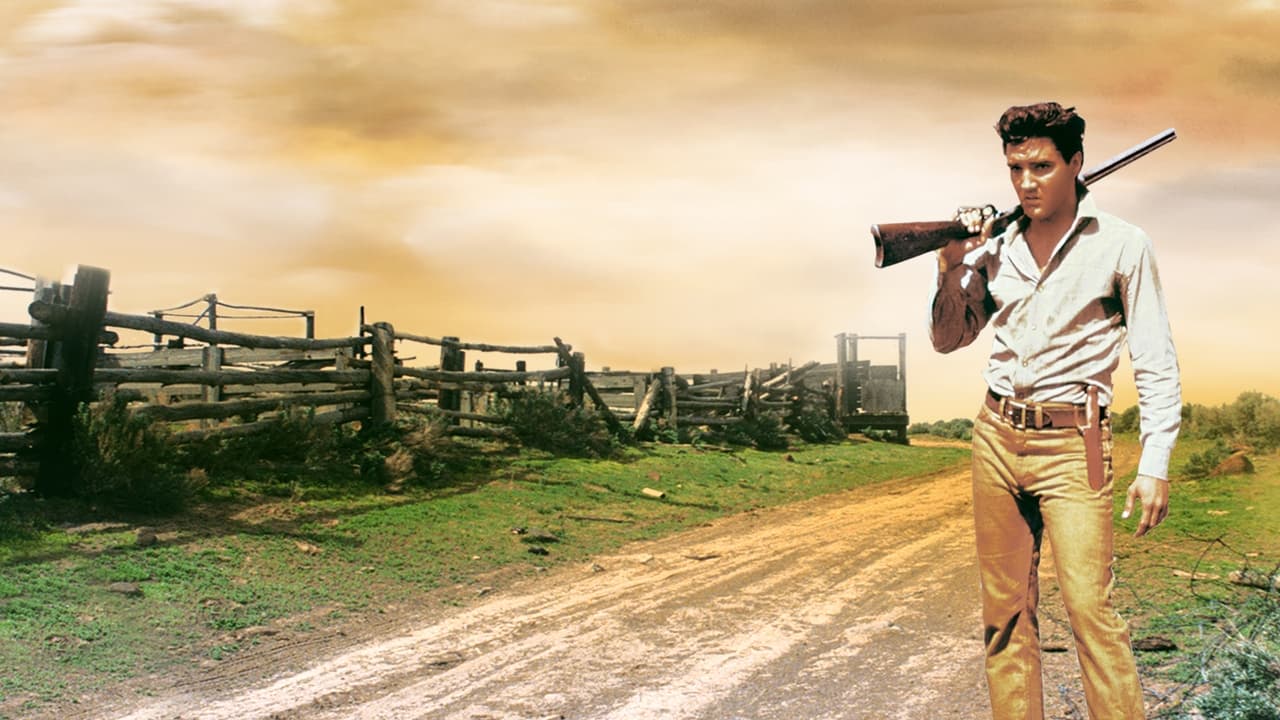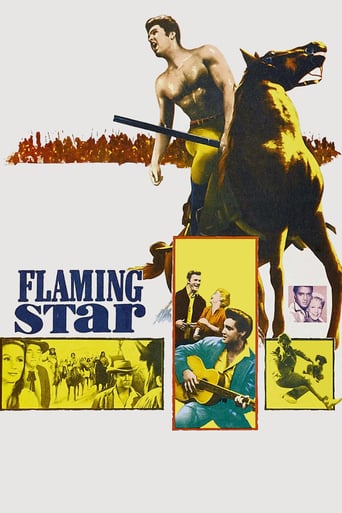

I haven't seen enough Elvis Presley movies to say whether this is one of his better ones as some other reviewers state, but the film being what it is, he does a competent job among a fair contingent of fellow actors in support roles. Interestingly, this is the second film in a row I've seen in which John McIntire figures prominently; he was an evil town boss up against Jimmy Stewart in "The Far Country", while here he's portraying the patriarch of a ranch family, maintaining his integrity as the husband of Kiowa Indian squaw Neddy (Dolores del Rio), who's translated name means 'thin woman who deserted her own people'.As a half-breed, Presley's character is torn between two races, particularly after new Kiowa chief Buffalo Horn (Rodolfo Acosta) renews his tribe's war against whites with raids on local ranchers, including the Burton homestead. Before it's explained, I thought 'Flaming Star' might have been Pacer's Indian name, but we soon learn that it refers to a dream or vision in which a flaming star signals impending doom or death. Two such instances occur in the story, once for Pacer's mother Neddy, and then again for Pacer himself at the finale.Most likely in keeping with the general dark tone of the story, Presley's appearance here doesn't bring with it a host of musical numbers. After offering the title song over the opening credits, there's only one more fairly lively number called "A Cane and a High Starched Collar" performed in front of family and friends before the story turns ominous.Directed by movie veteran Don Siegel, there's probably more graphic violence here than one might expect, particularly given the film's celebrity star in the lead role. A wicked Kiowa hatchet to a settler's forehead caught me by surprise, and Presley himself engaged in a pretty realistic looking tussle with his white brother Clint (Steve Forrest) in the story. I was surprised as well that Presley's character was allowed to die in the picture from mortal wounds suffered in the final battle, a fate generally not considered for entertainers as popular with the ladies as Elvis was.
... View MoreI was surprised and disappointed at the same time at this movie. Surprised because Elvis turned in a credible performance, disappointed because the fact the Don Siegel directed raised my expectations.Here's what I liked:Again, Elvis is just OK here, but looks great versus his other movie roles.OK story. I got sucked into it pretty good. I cared about most of the characters, even though it was a bit of a manipulative tear jerker.Pretty good performances by John McIntire and Delores Del RioI thought the character of the white brother Clint was pretty likable, and Steve Forest played him well.Now here's what kept the movie from being better:Fundamentally implausible that supposedly friendly neighbors of the Burtons would turn on them so quickly and so decisively. There was too much melodrama here. I didn't think they would have been so friendly to begin with or so against them after the Kiowa uprising.Sure, the Indians get a chance to voice their point of view, but how come they're the only ones that butcher innocent women? If the movie really wanted to be fair to Indians, wouldn't we also see white people killing innocent Indian women and children? Too harsh for white audiences? Undermines the anti-racism message.I always am uncomfortable watching these "tragic mulatto" plots. It doesn't seem fair that mixed race people are put into this extreme situations of being caught between groups. I imagine in most cases these people find their way OK. These highly charged melodramas come off as disrespectful to these folks.Poor use of landscapeNo comic reliefEnding was abrupt and contrived.
... View MoreFLAMING STAR is generally regarded as the film which provided Elvis Presley the best performance of his disappointing film career.It is totally out of kilter in what you would expect from a typical Elvis "romp".With a top director (Don Siegel),a literate script and story (by western veteran Clair Huffaker) and a solid supporting cast (John McIntire,Dolores Del Rio,Steve Forrest,Barbara Eden) behind him,there is indeed a very good case for this being the King's best dramatic performance,along with his other two oft-quoted top big screen vehicles (JAILHOUSE ROCK,KING CREOLE).Elvis himself only sings two songs,over the titles and in a fairly light-hearted opening scene during a birthday party for his half-brother (Forrest) involving family and friends at his parents' ranch.After these jollities,things quickly turn very grim;in a surprisingly graphic (for it's time) sequence,the friends aforementioned are brutally massacred by a group of Kiowa Indians;it is revealed soon after that Elvis is half-white,half Kiowa,and finds himself on the receiving end of much racist abuse from the same family and local townspeople thereafter.After seeing his parents killed,he decides he's had enough of the hostility he receives for being a half-breed,and reluctantly returns to his mother's people.But after witnessing a Kiowa attack on his brother,he again changes sides and nurses his half-sibling,guiding him by horse into town for medical treatment.But being torn between two races becomes too much for him;he rides into town one more time to bid goodbye to his brother,and rides away,dying,into the valley to see the 'flaming star',like his mother before her passing.All this is very well done,with a convincing performance by Presley.He shows himself perfectly capable of delivering his lines persuasively and effectively,with the right kind of resonance and depth;the number of sad,terrible events that overtake his life are believably conveyed,and he more than holds his own with such reliables as McIntire and Ms Del Rio.If there is a problem with FLAMING STAR,it is so relentlessly solemn and downbeat,with so many tragic events and often brutal killings abound.Siegel does a fine job of the direction (particularly with the action,in which he was always something of a master),but the sheer gloominess of the plot does not make for great entertainment;escapism this definitely isn't.This was probably the reason it wasn't a particular box-office success when first released;Elvis' manager,Colonel Tom Parker (curiously credited as a consultant on the film) apparently got cold feet after FLAMING STAR,and decided to plop Elvis into the fluffy,trite,and later increasingly asinine musicals for which he became so familiar with the next film onwards,in which all virtually had the same plot.Presley himself tired of this,and stopped making films in 1970.This was a considerable shame as Elvis certainly proved he was a perfectly good movie actor in this and his two other best films (as mentioned previously); if the script,production team,supporting cast and story were up to scratch.Post-FLAMING STAR,he rarely at all got the chance to work with anything like this quality,and although the King of rock n'roll was never the King of movie acting,subjects like FLAMING STAR proved that he was by no means a peasant or commoner when decent material was at his disposal.It is something of a tragedy that the Colonel didn't present him with such after this film.RATING:6 and a half out of 10.
... View MoreFor a movie that was originally planned for Brando, Elvis sure does a good job. According to the trivia, it was planned for Sinatra too. I'm assuming Sinatra would've played Clint, while Brando played Pacer.While some might find the movie to be too depressing, I say, it calls for it. A movie like this, with a story like this, can't have a happy ending. So if you're expecting the usual Presley picture with singing and all, look somewhere else. If you want a movie with a great script and many memorable lines and scenes, see Flaming Star. If you are a fan of Elvis, see this movie for sure. Elvis shows what a natural actor he is in this movie. He also proves that he could star in a serious movie with a serious role.If you are looking for a movie with action, look no further. Flaming Star has plenty of action. If you just want to see a good Western, see Flaming Star. Once you start watching Flaming Star you won't be able to stop. The movie had me watching up until the powerful ending. Everyone did their job well when they made this movie. Steve Forrest was great as Clint, Pacer's brother. Dolores del Rio was great as Neddy, Pacer's mother. John McIntire was great as Sam Burton, Pacer's father. Even the other supporting actors were great. Everyone was great. The actor that portrayed Buffalo Horn, Rudolph Acosta, was very memorable. Elvis was of course, great as Pacer. When you start watching the movie, in the beginning, it seems like the movie isn't really about Pacer. But later on in the movie when he has to make a choice of whether he will fight with the white man, his father's people, or the Kiowas, his mother's people, the movie gets very interesting. Elvis is put in many situations in the movie when he has to fight for his family and for his life. Pacer becomes the film's hero once the fighting starts. The whole movie is very powerful and unforgettable, so don't miss this one. You are in for a pleasant surprise. Elvis Presley fans will be pleased. Even people that aren't really fans of Elvis will be pleased. See this great movie and you won't be disappointed.
... View More